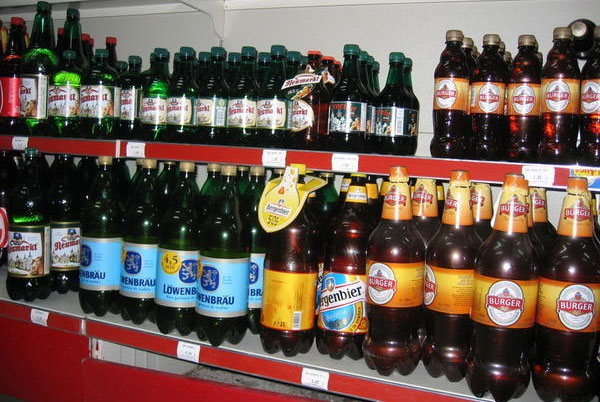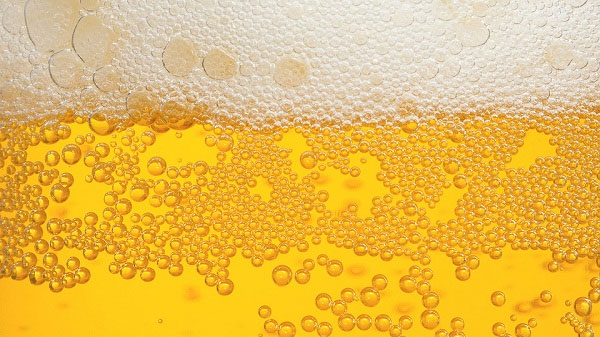Why is little beer packed in plastic bottles?
Plastic is a material that has a great impact on our lives. It is a cheap material that can be shaped into any shape and most importantly easy to reuse. But why don't we use plastic bottles for beer? Is it due to aesthetic problem? Taste? Or is there any other factor?
The fact that many people will be surprised is that beer is actually packed in plastic bottles in some countries, such as the UK. Here, plastic beer bottles are often seen at festivals or events. As at the 2012 London Olympics, the biggest drink sponsor, Heineken, produced about one million plastic beer bottles just for the occasion. Although the company explained that this job is for the environment, it can be seen that the main purpose is for safety reasons. At events where there are thousands of people from different cultures participating, a little glamor with competitions can be dangerous when accompanied by glass pieces.

So why is this beer bottle not widely used? One of the most appropriate answers is probably plastic that affects the taste of beer . Plastic is a more porous material than glass, so it makes beer more susceptible to "lightening" when contained in plastic bottles instead of glass bottles because the gas in drinks will be more volatile.

Another advantage of glass is that it almost does not affect the taste by chemical inertness (does not cause a chemical reaction with the contents). In contrast, plastics contain a lot of chemicals that can dissolve into beer and affect the taste, even the quality of drinks. For example, plastic is often used to make bottles of light alcoholic drinks, Polyethylene Terephthalate (PET) , will create a toxic element called Antimony (denoted by Sb) mixed in drinks. When stored at room temperature or lower, the amount of antimony emitted from these plastic bottles is negligible. But the concentration of antimony will increase in proportion to the temperature, so if stored in storage over the summer months, the amount of antimony in drinks can increase to levels that are harmful to health - according to the Environmental Protection Agency. USA.
Considering aluminum, like glass, this is a completely waterproof material, so it is also ideal for storing beer. But unlike plastic, the inside of aluminum cans are coated with a special polymer layer that prevents aluminum from leaking into drinks, so they are much safer. In addition, unlike the above two materials, aluminum completely prevents light, making drinks in aluminum cans better preserved than other bottles.
In fact, colored glass bottles have also been used to store beer because they can prevent light. But it is difficult to do the same thing with plastic, because the added chemicals to help prevent light will make this material harder to recycle than normal plastics.

Another problem with plastic bottles is that they cannot withstand the disinfection process that most beers must pass through. After being brewed and bottled, beer will often have to be put through a boiling water sprayer to kill the bacteria still alive after fermentation. This process is both to ensure food hygiene and safety, and to increase the shelf life of beer. And while glass bottles or aluminum cans can easily tolerate this process, plastic doesn't. That means either we have to skip the disinfection stage, or we have to choose a more durable plastic, which means higher costs.
There may still be brewers somewhere who are looking to put plastic beer bottles into widespread use, and try to convince consumers to change their habits (an almost impossible task). But at least in the near future, glass bottles and aluminum cans will still dominate the brewing industry worldwide.
- The habit of re-using plastic everyone does but brings unexpected harm
- A small 3D printing device that can help build houses with plastic bottles is easier than ever
- Processing waste plastic bottles into phone cases
- The idea of water bottles made of jelly, decompose soon after use
- Plastic bottles - gold mines in Taiwan
- We are about to wear clothes made from plastic bottles
- Change plastic bottles to get bus and city tickets and clean and reduce traffic jams
- 2 secrets about plastic bottles of water that many people would wish for 'I'd rather not know'
- Video: How to reuse plastic bottles with safe water
- Explain the phenomenon of foaming beer when smashed into the mouth of the bottle
- What does the triangle symbol usually print on the bottom of a plastic bottle mean?
- Build houses from recycled plastic bottles
 'Fine laughs' - Scary and painful torture in ancient times
'Fine laughs' - Scary and painful torture in ancient times The sequence of numbers 142857 of the Egyptian pyramids is known as the strangest number in the world - Why?
The sequence of numbers 142857 of the Egyptian pyramids is known as the strangest number in the world - Why? History of the iron
History of the iron What is alum?
What is alum?